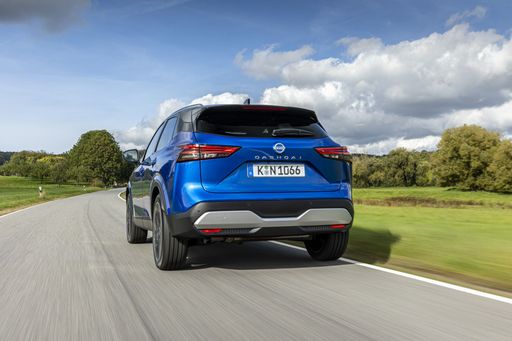Nissan Qashqai vs Toyota Prius - Differences and prices compared
Compare performance (205 HP vs 223 HP), boot space and price (29600 £ vs 39400 £ ) at a glance. Find out which car is the better choice for you – Nissan Qashqai or Toyota Prius?
Costs and Efficiency:
When it comes to price and running costs, the biggest differences usually appear. This is often where you see which car fits your budget better in the long run.
Nissan Qashqai has a evident advantage in terms of price – it starts at 29600 £ , while the Toyota Prius costs 39400 £ . That’s a price difference of around 9815 £.
Fuel consumption also shows a difference: Toyota Prius manages with 0.50 L and is therefore significantly more efficient than the Nissan Qashqai with 4.50 L. The difference is about 4 L per 100 km.
Engine and Performance:
Under the bonnet, it becomes clear which model is tuned for sportiness and which one takes the lead when you hit the accelerator.
When it comes to engine power, the Toyota Prius has a hardly perceptible edge – offering 223 HP compared to 205 HP. That’s roughly 18 HP more horsepower.
In acceleration from 0 to 100 km/h, the Toyota Prius is somewhat quicker – completing the sprint in 6.80 s, while the Nissan Qashqai takes 7.60 s. That’s about 0.80 s faster.
In terms of top speed, the Nissan Qashqai performs to a small extent better – reaching 206 km/h, while the Toyota Prius tops out at 177 km/h. The difference is around 29 km/h.
Space and Everyday Use:
Beyond pure performance, interior space and usability matter most in daily life. This is where you see which car is more practical and versatile.
Both vehicles offer seating for 5 people.
In curb weight, Nissan Qashqai is somewhat lighter – 1420 kg compared to 1620 kg. The difference is around 200 kg.
In terms of boot space, the Nissan Qashqai offers clearly more room – 504 L compared to 284 L. That’s a difference of about 220 L.
When it comes to payload, Nissan Qashqai evident takes the win – 520 kg compared to 375 kg. That’s a difference of about 145 kg.
Who wins the race in the data check?
The Toyota Prius is decisively ahead in the objective data comparison.
This result only shows which model scores more points on paper – not which of the two cars feels right for you.
Costs and Consumption
View detailed analysis
Engine and Performance
View detailed analysis
Dimensions and Body
View detailed analysis

Toyota Prius
Nissan Qashqai
The Nissan Qashqai blends practical, family-friendly packaging with SUV styling that refuses to shout, making it a sensible and dependable choice for everyday life. It’s comfortable to live with, economical on the road, and neatly equipped enough to feel modern without ever feeling precious — perfect if you want crossover versatility without the drama.
details




Toyota Prius
The Prius glides through traffic like a wise commuter's secret weapon, balancing miserly running costs with an unflappable sense of reliability. It's not a thrill seeker, but its roomy cabin, sensible packaging and low-stress driving personality make it a brilliant choice for buyers who value peace of mind over pulse-raising performance.
details



Costs and Consumption |
|
|---|---|
|
Price
29600 - 39900 £
|
Price
39400 - 45800 £
|
|
Consumption L/100km
4.5 - 6.8 L
|
Consumption L/100km
0.5 - 0.7 L
|
|
Consumption kWh/100km
-
|
Consumption kWh/100km
-
|
|
Electric Range
-
|
Electric Range
72 - 86 km
|
|
Battery Capacity
-
|
Battery Capacity
-
|
|
co2
102 - 154 g/km
|
co2
12 - 17 g/km
|
|
Fuel tank capacity
55 L
|
Fuel tank capacity
40 L
|
Dimensions and Body |
|
|---|---|
|
Body Type
SUV
|
Body Type
Hatchback
|
|
Seats
5
|
Seats
5
|
|
Doors
5
|
Doors
5
|
|
Curb weight
1420 - 1665 kg
|
Curb weight
1620 - 1630 kg
|
|
Trunk capacity
479 - 504 L
|
Trunk capacity
284 L
|
|
Length
4425 mm
|
Length
4599 mm
|
|
Width
1835 mm
|
Width
1782 mm
|
|
Height
1625 mm
|
Height
1470 mm
|
|
Max trunk capacity
1422 - 1447 L
|
Max trunk capacity
-
|
|
Payload
466 - 520 kg
|
Payload
365 - 375 kg
|
Engine and Performance |
|
|---|---|
|
Engine Type
Petrol MHEV, Full Hybrid
|
Engine Type
Plugin Hybrid
|
|
Transmission
Manuel, Automatic
|
Transmission
Automatic
|
|
Transmission Detail
Manual Gearbox, CVT, Reduction Gearbox
|
Transmission Detail
CVT
|
|
Drive Type
Front-Wheel Drive, All-Wheel Drive
|
Drive Type
Front-Wheel Drive
|
|
Power HP
140 - 205 HP
|
Power HP
223 HP
|
|
Acceleration 0-100km/h
7.6 - 10.2 s
|
Acceleration 0-100km/h
6.80 s
|
|
Max Speed
170 - 206 km/h
|
Max Speed
177 km/h
|
|
Torque
240 - 330 Nm
|
Torque
-
|
|
Number of Cylinders
3 - 4
|
Number of Cylinders
4
|
|
Power kW
103 - 151 kW
|
Power kW
164 kW
|
|
Engine capacity
1332 - 1498 cm3
|
Engine capacity
1998 cm3
|
General |
|
|---|---|
|
Model Year
2025
|
Model Year
2023
|
|
CO2 Efficiency Class
E, C
|
CO2 Efficiency Class
B
|
|
Brand
Nissan
|
Brand
Toyota
|
Is the Nissan Qashqai offered with different drivetrains?
Available configurations include Front-Wheel Drive or All-Wheel Drive.




